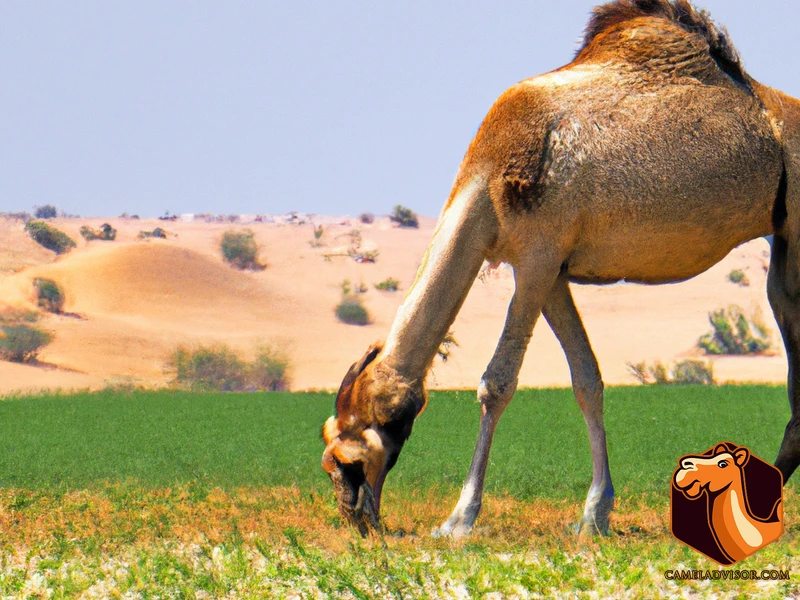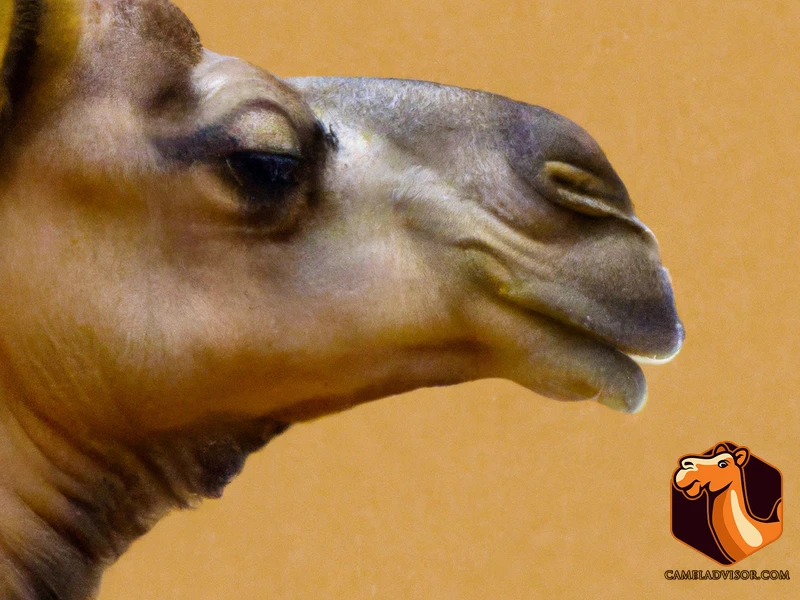Raising camels has been an important aspect of agriculture for centuries. Pregnant and lactating camels require proper nutrition for their health and the health of their offspring. However, determining the optimal diet for these animals can be a perplexing task. Providing camels with inadequate nutrition can have negative effects on their health, while giving them adequate nutrition has several benefits. In this article, we will explore the importance of proper nutrition for pregnant and lactating camels, and provide guidelines for feeding them. We will also discuss water requirements and feeding tips to ensure that these animals receive the best possible care.
Contents
Importance of Proper Nutrition for Pregnant and Lactating Camels

The health and productivity of pregnant and lactating camels heavily rely on adequate nutrition. Proper nutrition during pregnancy and lactation improves the offspring’s growth and health, as well as the mother’s milk production and overall body condition. However, a lack of essential nutrients and minerals can lead to metabolic disorders, weakened immune systems, and reproductive issues in both the mother and offspring. It is crucial to understand the nutrient requirements and feeding guidelines for pregnant and lactating camels to maintain their health and productivity. In this article, we will discuss the importance of proper nutrition for pregnant and lactating camels and the benefits of providing adequate nutrition, as well as the recommended nutrient intake and feeding guidelines. We will also cover tips and considerations for monitoring the camel’s body condition score and postpartum nutritional requirements.
Effects of Poor Nutrition on Camels
Poor nutrition can have detrimental effects on camels during pregnancy and lactation. When camels do not receive adequate amounts of protein, they may have decreased milk production and a higher risk of birthing weaker offspring. Insufficient fiber intake can lead to digestive problems and malnutrition. On the other hand, overfeeding camels with concentrated feeds can cause obesity and related health issues such as joint problems and laminitis.
It is important to note that the quality of the feed also has an impact on camel health. Poor quality forage and roughage can lead to vitamin and mineral deficiencies, which may increase the risk of bone fractures and other health problems. When camels do not have access to clean, fresh water, they may experience dehydration, which can affect milk production, digestion, and overall health.
Providing proper nutrition is crucial for maintaining the health of pregnant and lactating camels, and failing to meet their nutritional needs can have significant negative consequences for both the animals and their offspring.
Benefits of Providing Adequate Nutrition to Pregnant and Lactating Camels
Adequate nutrition is crucial for the health and well-being of pregnant and lactating camels. Providing enough nutrients and energy to these animals during these critical periods can have many benefits.
Firstly, proper nutrition can help boost the immune system of pregnant and lactating camels, helping to prevent illnesses and diseases that could harm both the mother and the offspring. This is especially important in areas where veterinary care may be limited.
Proper nutrition can also help to prevent reproductive problems and improve fertility in camels. This is because the reproductive system requires adequate amounts of energy and nutrients to function properly. Feeding a balanced diet can help ensure that the camel’s nutritional needs are met, improving their overall reproductive health.
In addition, adequate nutrition can improve the quality and quantity of milk produced by lactating camels. This is important for the growth and development of the young ones. Milk of adequate quality and quantity helps the young ones gain weight correctly, have a better immune system and stay healthy.
Providing appropriate nutrition for pregnant and lactating camels can prevent nutrient deficiencies that may lead to health problems or even death. For instance, deficiencies in calcium, phosphorus, or vitamin D can lead to bone problems both in mother and offspring. Lack of vitamin A can make the camel prone to damage from infections and other illnesses.
Lastly, providing proper nutrition for pregnant and lactating camels can improve overall productivity and profitability of camel farming. A well-fed camel produces more milk, is less prone to diseases, and is likely to have a healthier offspring which means reduced expenses related to veterinary care.
It’s important to remember that the benefits of proper nutrition can only be attained when a camel is fed a balanced and appropriate diet. Overfeeding or underfeeding can lead to a loss of productivity, reduced fertility, and even death. For further information on how to feed camels, please refer to the Balanced Diet for Captive Camels article.
Nutrient Requirements of Pregnant and Lactating Camels
Camels have unique nutritional requirements during pregnancy and lactation, which are different from those of non-pregnant and non-lactating camels. In general, pregnant and lactating camels need more nutrients than their non-pregnant or non-lactating counterparts because they are supporting the growth and development of a fetus or producing milk for their offspring.
Energy: Pregnant and lactating camels have higher energy requirements compared to non-pregnant and non-lactating ones. The energy requirements during pregnancy and lactation phases are dependent on the weight of the animal and the milk production rate, respectively.
Protein: Protein is required for the growth and development of fetuses and milk production for lactating camels. Pregnant and lactating camels require approximately 11 percent protein in their diet. However, they should not be fed an excessive amount of protein, as it may cause kidney damage and reduced milk production.
Fiber: Fiber is important for gut health and prevents digestive issues in camels, pregnant or non-pregnant. It also helps in weight management and promotes milk production. Roughage and forage should make up the majority of the diet of pregnant and lactating camels.
Vitamins: Vitamins are required to facilitate metabolic reactions and sustain a healthy immune system in camels. Pregnant and lactating camels require an adequate amount of water-soluble and fat-soluble vitamins, which can be obtained from quality feedstuffs or supplements depending on availability.
Minerals: Minerals are necessary for strong bones, joints, and other physiological functions in camels. Calcium and phosphorus are the most important minerals during pregnancy and lactation because they are needed for fetal skeletal development and milk production, respectively. Salt should also be provided in the diet; however, it should be given in moderation because overfeeding camels with salt can lead to health issues.
It is important to understand the nutrient requirements of pregnant and lactating camels to ensure that they receive the appropriate diet to maintain optimal health and productivity. Additionally, understanding the benefits and drawbacks of feeding camels salt, maintaining camel bone health requirements, proper feeding practices for working camels, the effects of overfeeding camels, water diet for camels, and vitamin deficiencies in camels can promote better management practices.
Feeding Guidelines for Pregnant and Lactating Camels
Feeding pregnant and lactating camels requires careful attention and adequate nutrition to ensure the health and wellbeing of both the mother and offspring. With their unique digestive system and nutritional requirements, it is essential to follow proper feeding guidelines to meet the nutrient needs of these camels during this critical time. In this section, we will discuss various feeding guidelines, including forage and roughage, concentrates, and supplements. Additionally, we will highlight the importance of monitoring water quality and intake. To learn more about camel nutrition, check out our article on the benefits and drawbacks of feeding camels salt or how fiber plays a crucial role in a camel’s diet.
Forage and Roughage
Feeding pregnant and lactating camels with an appropriate diet is crucial for their health and the health of their offspring. Forage and roughage are essential components of the diet for camels and provide them with the necessary fiber for healthy digestion.
Forage: Forage is the edible part of plants that are consumed by animals when they are grazing or browsing. Pregnant and lactating camels require high-quality forage to stay healthy, and the amount of forage to be given to them depends on their weight, stage of pregnancy, and milk production level. Good quality forage sources for camels include alfalfa, clover, and oat hay. A recommended daily allowance of forage for a pregnant camel is around 2-2.5% of her body weight, and for a lactating camel, it is around 2.5-3% of her body weight.
Roughage: Roughages are fibrous materials that are essential for the proper functioning of the digestive system of camels. Roughages can be provided to camels in the form of hay, straw, or silage. The roughage should be of good quality, and the amount of roughage should be adjusted according to the animal’s weight, age, and stage of pregnancy. The recommended daily allowance of roughage for pregnant and lactating camels is similar to that of forage.
| Type of roughage | Quantity (Kg/day) |
|---|---|
| Hay | 1-2% of body weight |
| Straw | 0.5-1.5% of body weight |
| Silage | 0.5-1.5% of body weight |
It is essential to ensure that the forage and roughage given to camels are free of molds and other contaminants that can cause adverse health effects. A veterinarian should be consulted if there is any concern about the quality of the hay or straw being fed to the camel.
Providing adequate forage and roughage to pregnant and lactating camels is essential for their health and productivity. It is important to feed them the appropriate type and amount of forage and roughage according to their weight and stage of pregnancy. For more information on proper feeding practices for working camels, click on this link.
Concentrates
When it comes to feeding concentrated feeds to pregnant and lactating camels, it is important to consider the nutrient requirements and to provide a balanced feed ration. Concentrates such as grains and oilseed meals can provide additional energy, protein, and micronutrients to the diet.
Energy requirements: Pregnant and lactating camels require higher levels of energy. During the last trimester of pregnancy and the first few months of lactation, the energy requirement can increase by up to 50% compared to maintenance levels. It is important to provide enough energy through the diet, which can be done through the addition of high-energy feeds, such as barley, wheat bran, and corn.
Protein requirements: Protein is essential for the growth and development of the fetus, as well as for the milk production of lactating camels. Large amounts of protein are not necessary, but a balanced diet that includes adequate amounts of protein is important. Camel diets should contain at least 8-10% crude protein during pregnancy and a minimum of 12% during lactation. Feeds such as soybean meal, cottonseed meal, and dried distillers grains can provide additional protein to the diet. To learn more about how much protein camels need, check out our previous article on this topic.
Fiber requirements: Pregnant and lactating camels require adequate fiber intake to maintain a healthy rumen function. It is important to select high-quality feeds that are low in fiber, such as wheat bran and corn, to maintain good rumen health while also meeting energy and protein requirements.
Micronutrient requirements: Pregnant and lactating camels have increased requirements for micronutrients such as vitamins and minerals. Concentrate feeds such as wheat bran and corn are good sources of energy but are poor in micronutrients. This is why it’s important to supplement the diet with a mineral and vitamin premix or feed concentrates that contain added vitamins and minerals.
However, feeding too many concentrates can lead to overfeeding and obesity, which can lead to negative health effects such as joint problems and reduced reproductive performance. To avoid these consequences, the concentrate feed should be limited to a maximum of 40% of the total diet.
Overfeeding of concentrates can have adverse effects on camel’s bone health, as it can increase the level of phosphorus in the diet and cause calcium deficiency, leading to decreased bone density. To learn more about camel’s bone health requirements, check out our previous article on this topic. To prevent vitamin deficiencies, it is recommended to provide the camels with a mineral and vitamin premix or feeds that include added vitamins and minerals. In order to learn more about vitamin deficiencies in camels, click on this article: Vitamin Deficiencies in Camels.
Taking into account the nutrient requirements of pregnant and lactating camels and feeding balanced diets with appropriate amounts of concentrates, can improve production levels and ensure good health.
Supplements
Supplements are additional feed sources that can provide extra nutrients to pregnant and lactating camels. It is important to note that supplements should not replace the role of forage and concentrates in a camel’s diet, as they are only meant to complement the nutritional needs of the animal.
1. Protein Supplements: Protein is an essential nutrient for pregnant and lactating camels, and it is crucial for the growth and development of the fetus or the calf. Legume hay, such as alfalfa and clover, is a good source of protein, which can be fed to the camels as a supplement. Alternatively, soybean meal or cottonseed meal can be added to the concentrate mix to increase the protein content.
2. Mineral Supplements: Minerals are required in small amounts in the camel’s diet, but they play a significant role in maintaining the animal’s health. Pregnant and lactating camels need mineral supplements to support the growth and development of the fetus or the calf. Commonly used mineral supplements include salt, calcium, phosphorus, and magnesium.
3. Vitamins Supplements: Vitamins are essential for various physiological functions in the camel’s body, such as immunity, metabolism, and growth. Vitamin E and selenium supplements are commonly used in the diet of pregnant camels to support the development of the fetus. However, it is important to note that an excess of these vitamins can lead to toxicity and other health problems.
4. Fat Supplements: Fat is a rich source of energy and is required in the camel’s diet for milk production, maintaining body condition, and supporting the growth of the fetus or the calf. Adding vegetable or fish oil to the concentrate mix can increase the fat content and provide additional energy to the animal.
It is crucial to consult a veterinarian or an animal nutritionist to determine the appropriate supplements for individual camels, as over-supplementation can lead to health problems, including obesity and mineral toxicity. Additionally, a camel’s supplement intake should be strictly monitored to avoid overloading the animal’s digestive system.
Supplements, like any other feed source, should be provided in adequate amounts and should not be used as the sole source of nutrition for the camel. Proper forage, concentrate, and supplement management can help provide essential nutrients for the pregnant and lactating camels to maintain their health and support the growth and development of the fetus or the calf.
Finally, the role of water in a camel’s diet should not be overlooked, especially during pregnancy and lactation. You can learn more about water requirements for pregnant and lactating camels in the relevant section of this article.
Water Requirements for Pregnant and Lactating Camels

As important as proper nutrition is for pregnant and lactating camels, adequate water intake is equally crucial at all times, even more so during pregnancy and lactation. Camels can survive for long periods of time without food, but dehydration can be deadly for them. Understanding the water requirements of pregnant and lactating camels and ensuring that the water they consume is of high quality is vital for their health and the health of their offspring. In this section, we will discuss the water intake of pregnant and lactating camels, as well as the importance of water quality.
Water Intake of Pregnant and Lactating Camels
When it comes to the water intake of pregnant and lactating camels, it is crucial to ensure that they have access to clean and fresh water at all times. Camels have a higher tolerance for dehydration than other animals, but they still require significant amounts of water, especially during pregnancy and lactation.
According to research, the average water intake for pregnant and lactating camels is between 40-60 liters per day, with lactating camels requiring more water than pregnant ones. The amount of water intake depends on various factors such as temperature, humidity, and the camel’s weight.
It is essential to keep track of the water intake of camels to ensure that they are consuming an adequate amount. These guidelines can help with monitoring their water intake:
| Camel Weight (kg) | Water Intake (Liters/Day) – Pregnant | Water Intake (Liters/Day) – Lactating |
|---|---|---|
| 400-500 | 10-12 | 17-20 |
| 500-600 | 12-15 | 20-25 |
| 600-700 | 15-20 | 25-30 |
| 700-800 | 20-25 | 30-35 |
Additionally, it is crucial to offer water that is free from contaminants such as pollutants, harmful bacteria, and heavy metals. Contaminated water can negatively affect the health of pregnant and lactating camels, leading to dehydration, diarrhea, and other illnesses.
Providing an adequate amount of clean and fresh water is essential for pregnant and lactating camels. Monitoring their water intake and offering clean water can help maintain their health and ensure successful pregnancy and lactation.
Water Quality
Ensuring good quality water is crucial for the health and well-being of pregnant and lactating camels. Poor water quality can lead to a range of health problems, including dehydration, kidney damage, and reproductive issues.
To provide good quality water for camels, the following guidelines should be followed:
- Water source: The water source should be clean and free from contaminants such as pollutants, harmful chemicals, and pathogens. Camels should be provided with access to fresh, clean water at all times.
- Water temperature: Camel’s require water at temperatures between 10-20°C. Water that is too cold or too hot can have negative effects on the reproductive and digestive systems of camels, and can even cause shock.
- Water availability: Camels should have access to ample water, especially during the last few months of pregnancy and during lactation. It is recommended to provide pregnant and lactating camels with water at regular intervals throughout the day.
- Water quality testing: The water quality should be tested regularly to ensure optimal levels of minerals, pH, and other factors. Any abnormalities or imbalances should be addressed immediately to avoid health issues.
- Water treatment: If the water source is not ideal, it may be treated with chemicals or other cleaning methods to ensure good quality water. However, care should be taken to avoid over-treatment or chemical residues that can be harmful to camels.
Inadequate water quality can cause health problems for camels, which can affect reproduction, lactation, and overall health. By ensuring good water quality and availability, camel owners can help to promote the health and well-being of their animals.
Feeding Tips for Pregnant and Lactating Camels
When it comes to feeding pregnant and lactating camels, there are several important tips to keep in mind to ensure the health and well-being of both the mother and her offspring. As these stages are crucial for the development of the camel, it is essential to provide them with adequate nutrition and care. In this section, we will discuss some effective feeding tips that can help you ensure that your pregnant and lactating camel receives the right nutrients, in the right amounts, at the right time. From monitoring body condition score to feeding frequency, these tips will help you keep your camel healthy and nourished throughout their reproductive cycle.
Frequency of Feeding
Camels should be provided with frequent feedings during pregnancy and lactation. This is important to ensure that they receive enough nutrients to support their own needs as well as the growth and development of their fetuses or young ones. It is recommended to feed pregnant and lactating camels at least 2-3 times a day.
Underfeeding or overfeeding can have negative impacts on the health of camels and their young, so it is important to follow a consistent feeding schedule and monitor their body condition score.
During pregnancy, the feedings should gradually increase, starting from the 4th or 5th month of gestation, in order to meet the increasing nutritional demands. On the other hand, once the young one is born, the feedings should be slowly decreased to prevent obesity and other health issues.
The camel’s diet should also be adjusted based on the stage of pregnancy or lactation. In the last trimester of pregnancy, for example, the camel’s diet should consist of about 70% roughage and 30% concentrate while during lactation, the proportion should be reversed with increased concentrate and reduced roughage.
A consistent and well-monitored feeding schedule that matches the camel’s energy and nutrient requirements is crucial for maintaining optimal health and productivity of both the camel and the offspring.
Monitoring Body Condition Score
Proper monitoring of the body condition score (BCS) of pregnant and lactating camels is crucial to ensure that they are receiving adequate nutrition. BCS is a visual and tactile assessment of the level of body fat reserves in an animal. This is done through palpation of specific areas of the body and assigning a score based on the amount of fat present.
The BCS scoring system is typically done on a scale of 1 to 5, with 1 being extremely thin and 5 being extremely obese. Camels have a unique adipose tissue distribution, with much of it located in the hump rather than around the body. It is important to assess the fat reserves in the hump area as well.
An ideal BCS for a pregnant or lactating camel is between 2.5 to 3.5. A lower BCS indicates that the camel may not be receiving enough nutrients to support pregnancy and lactation, while a higher BCS can lead to complications such as dystocia (difficult birth) and reduced milk production.
Table: Body Condition Score System for Camels
| Score | Description |
|——-|————-|
| 1 | Extremely Thin |
| 1.5 | Severely Thin |
| 2 | Moderately Thin |
| 2.5 | Slightly Thin/Under Condition |
| 3 | Moderate Condition |
| 3.5 | Slightly Fat |
| 4 | Moderately Fat |
| 4.5 | Fat |
| 5 | Obese |
It is important to monitor a camel’s BCS throughout pregnancy and lactation, as their nutritional requirements may change. Regular weighing of the animal can also provide insight into their nutritional status. If the BCS is too low, adjustments to the feeding regime should be made to ensure the camel is receiving adequate nutrition.
Proper monitoring of the body condition score of pregnant and lactating camels is an important aspect of their nutritional management. A BCS between 2.5 to 3.5 is ideal, and adjustments to the feeding regime should be made if necessary to ensure the camel is receiving adequate nutrition.
Post-Partum Nutritional Requirements
After giving birth, camels have increased nutritional requirements to support the production of milk and maintain their own health. It is important to provide the right balance of nutrients to help them recover. The table below outlines the recommended post-partum nutritional requirements for camels:
| Nutrient | Requirements | Notes |
|---|---|---|
| Protein | 14-16% | Higher than the requirements during pregnancy |
| Fiber | 25-29% | High-quality forage and roughage should be provided |
| Energy | 1.5 times maintenance requirements | Higher than the requirements during pregnancy |
| Fat | 5-7% | Important for lactation and weight maintenance |
| Vitamins | A, D, E | Important for milk production and overall health |
| Minerals | Calcium, Phosphorus, Magnesium | Important for milk production and bone health |
It’s important to note that a camel’s nutritional requirements may vary based on its body condition score and the quality of forage and roughage available. Regular monitoring and adjustment of the feeding program can help ensure the camel receives the appropriate nutrition. Providing adequate nutrition during the post-partum period can help maintain the health of both the mother and the calf.
Conclusion
In conclusion, proper nutrition is crucial for the health and well-being of pregnant and lactating camels. Inadequate nutrition can lead to various health issues, including decreased milk production, reproductive problems, and even death. It is essential to provide pregnant and lactating camels with a balanced diet that meets their specific nutrient requirements. This means incorporating a variety of forage, roughage, concentrates, and supplements into their diet.
It is also important to ensure that pregnant and lactating camels have access to clean, quality water. Water consumption is especially important during lactation, as water makes up a significant proportion of milk production. Monitoring the body condition score of pregnant and lactating camels is also critical to ensure that they are receiving optimal nutrition.
Finally, it is important to note that post-partum nutritional requirements may differ from those during pregnancy and lactation. Consultation with a veterinarian or animal nutritionist can provide guidance on the specific nutritional needs of pregnant and lactating camels, based on age, body weight, and other factors.
Overall, there is no one-size-fits-all approach to feeding pregnant and lactating camels. Providing them with a balanced diet that meets their unique nutritional requirements will ultimately lead to healthier, happier camels and higher milk production.
Frequently Asked Questions
Question 1?
What are the effects of poor nutrition on pregnant and lactating camels?
Answer:
Poor nutrition during pregnancy and lactation can result in decreased fertility, increased risk of stillbirth, low birth weight, decreased lactation and milk quality, and an increased incidence of health issues in both the mother and offspring.
Question 2?
What are the benefits of providing adequate nutrition to pregnant and lactating camels?
Answer:
Adequate nutrition can improve fertility, increase birth weight and survival rates, optimize milk production and quality, and reduce the risk of health issues in the mother and offspring.
Question 3?
What are the nutrient requirements for pregnant and lactating camels?
Answer:
Pregnant and lactating camels require a diet high in energy, protein, and minerals such as calcium and phosphorus. They also require specific vitamins, such as vitamin A and E, for the health of the fetus or calf.
Question 4?
What is the role of forage and roughage in the diet of pregnant and lactating camels?
Answer:
Forage and roughage provide essential fiber for proper digestive function and help maintain a healthy weight. They also contain essential vitamins and minerals needed for metabolic function.
Question 5?
What are the best concentrates to feed pregnant and lactating camels?
Answer:
Concentrates high in energy and protein, such as grains and oilseeds, are good choices for pregnant and lactating camels. However, the exact type and amount of concentrate should be balanced with forage intake and adjusted to meet individual needs.
Question 6?
What supplements are recommended for pregnant and lactating camels?
Answer:
Supplements such as salt, minerals, and vitamins including A and E, should be offered to pregnant and lactating camels to ensure essential nutrient intake. However, consultation with a veterinarian or nutritionist is recommended to determine the exact supplement requirements.
Question 7?
How much water do pregnant and lactating camels need?
Answer:
Pregnant and lactating camels require between 50-150 liters of water per day, depending on their size, activity level, and environmental conditions.
Question 8?
What should be the quality of the water provided to pregnant and lactating camels?
Answer:
Clean, fresh and potable water is essential. Providing water of low quality can lead to a decrease in water consumption and result in dehydration, decreased productivity, and various health issues.
Question 9?
How often should pregnant and lactating camels be fed?
Answer:
Pregnant and lactating camels must be fed frequently, at least twice a day, to ensure proper energy and nutrient intake. Additionally, their diet should be continually monitored, and the amount of feed adjusted according to their individual needs.
Question 10?
What are the post-partum nutritional requirements for camels?
Answer:
Post-partum camels have higher energy and protein requirements to produce milk and support the growth and development of their offspring. A balanced diet with adequate vitamins and minerals, including calcium and phosphorus, should be provided to ensure optimal health and productivity.







